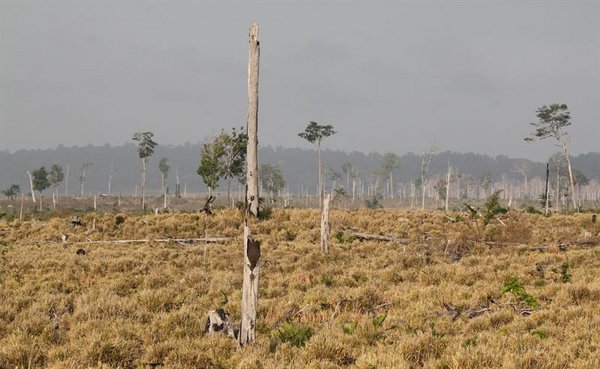- Share this article
- Subscribe to our newsletter
Step-change needed to halt deforestation
Between 90 and 99 per cent of all deforestation in the tropics is driven directly or indirectly by agriculture, according to a study published in September 2022. Yet only half to two-thirds of this results in the expansion of active agricultural production on the deforested land.
The study is a collaboration between many of the world’s leading deforestation experts and provides a new synthesis of the complex connections between deforestation and agriculture, and what this means for current efforts to drive down forest loss. The study shows that the amount of tropical deforestation driven by agriculture is higher than 80 per cent, the most commonly cited number for the past decade.
This comes at a crucial time, following the Glasgow Declaration on Forests at COP26 and ahead of the UN Biodiversity Conference (COP15) later this year, and can help ensure that urgent efforts to tackle deforestation are guided and evaluated by an evidence base fit for purpose.
Some deforestation is ‘for nothing’
The fact that agriculture is the main driver of tropical deforestation is not new. However, previous estimates of how much forest has been converted to agricultural land across the tropics varied widely – from 4.3 to 9.6 million hectares per year between 2011 and 2015. The study’s findings narrow down this range to 6.4 to 8.8 million hectares per year and help explain the uncertainty in the numbers.
While agriculture is the ultimate driver, forests and other ecosystems have often been cleared for land speculation that never materialised, projects that were abandoned or ill-conceived, or land that proved unsuitable for cultivation, the researchers point out. They also refer to fires that spread into forests neighbouring cleared areas.
Understanding the significance of these drivers is key for policy-makers, the researchers say – whether in consumer markets such as the European Union’s recently proposed due diligence legislation for “deforestation free products”, private sector initiatives for specific commodities, or for rural development policy in producer countries.
Pasture, soy and palm oil are key drivers
The study makes clear that a handful of commodities are responsible for the majority of deforestation linked to actively producing agricultural land – well over half of which is linked to pasture, soy and palm oil alone. But it also calls out the shortcomings of sector-specific initiatives that are limited in their ability to deal with indirect impacts.
The study’s findings point to the need for supply chain interventions to go beyond a focus on specific commodities and risk management, to help drive genuine partnerships between producer and consumer markets and governments.
This needs to include strong incentive-based measures that make sustainable agriculture economically attractive, while disincentivising further conversion of native vegetation and supporting the most vulnerable smallholder farmers.
The authors maintain that measures should focus more strongly on domestic markets, often the biggest drivers of demand for many commodities, including beef, and should include a strengthening of partnerships between companies, governments and civil society in producer jurisdictions.
Stronger evidence base needed
There are still critical knowledge gaps, the authors point out, where a stronger evidence base is needed to better target efforts to reduce deforestation. Despite these knowledge gaps and remaining uncertainties, the study stresses that a step-change in efforts is urgently needed to effectively tackle and curb deforestation and conversion of other ecosystems and to foster sustainable rural development.
The Glasgow Declaration on Forests recognised the importance of jointly addressing the crises of climate and biodiversity loss and set a new level of ambition for tackling deforestation and promoting sustainable agriculture. The authors of this study say it is paramount that we begin to see individual countries and policy-makers prioritise the realisation of this ambition.
(Chalmers University of Technology/ile)
Read more at Chalmers University of Technology website





Add a comment
Be the First to Comment